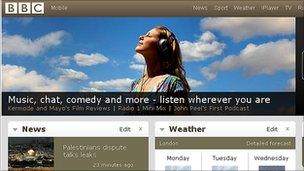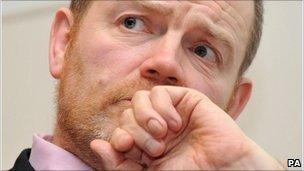BBC to cut online budget by 25%
- Published

BBC Online's budget will be cut by £34m by 2013-14
The BBC is to cut about 200 websites as it reduces the amount of money it spends on its online output.
The changes, which will see BBC Online's budget cut by £34m, will also result in the loss of up to 360 posts over the next two years.
Among the sites to close include teen services Switch and Blast and community site 606.
The plans are part of the BBC's cost-cutting measures to make 20% savings as a result of the licence fee settlement.
The BBC says the changes are intended to make its website more distinctive and reduce competition with commercial websites.
Skills website RAW and documentary website Video Nation will also be closed under the reorganisation. Community site h2g2 will also be disposed of.
Other reductions include the replacement of the majority of programme websites with automated content and the automation of bespoke digital radio sites 1Xtra, 5 live sports extra, 6 Music and Radio 7.
'Refocusing priorities'
There will be fewer news blogs while standalone forums, communities and message-boards will be reduced and replaced with integrated social tools.
There will also be a reduction in the overall amount of sports news, live sport and showbusiness news, but also more culture and arts coverage on the news website.

BBC director general Mark Thompson admitted the changes would be 'painful'
Local sites will additionally no longer publish non-news features content.
About 180 websites are expected to close ahead of schedule later this year. The overall changes will be made by February 2013-14.
BBC director general Mark Thompson said: "BBC Online is a huge success, but our vast portfolio of websites means we sometimes fall short of expectation.
"A refocusing on our editorial priorities, a commitment to the highest quality standards, and a more streamlined and collegiate way of working will help us transform BBC Online for the future."
He acknowledged the changes would be "painful" but insisted BBC Online "lies at the heart" of the corporation's digital future.
The National Union of Journalists (NUJ) condemned the move.
"The attack on BBC jobs and online services shows the BBC's contempt for hard-working staff. It makes no sense to cut back the BBC website as increasing numbers of people rely on the internet," said NUJ secretary Jeremy Dear.
"The NUJ will not stand by idly if members are forced out of their jobs," he added.
As part of the BBC's Putting Quality First strategy, BBC Online will form 10 distinctive areas: News, Sport, Weather, CBeebies, CBBC, Knowledge & Learning, Radio & Music, TV & iPlayer, Homepage and Search.
'Better service'
Roly Keating, the BBC's director of archive content, said the website had "grown like Topsy", adding "we just don't need" the sites that are to be closed.
He said the BBC's online offering would become easier to navigate.
Erik Huggers, the BBC's Director of Future Media and Technology, said the corporation had created a single, united strategy, making "a better service for audiences".
Editorial focus would be on high-quality news, clearer local sites on news, sport, weather and travel and creative spaces for children.
The iPlayer will also be reshaped, bringing together programming and programming information with archive content.
The BBC also published a list of things it would not do in future.
These commitments include not to launch a social networking site, publish local listings, run online-only music sessions or pay for exclusive online sports rights.
The corporation also said it wanted to double the number of referrals to external websites to 22 million each month by 2013/14.
The BBC has previously come under fire from other media organisations for the wide-ranging nature of its output.
In 2009, James Murdoch accused it of a "land grab" in a struggling media market and said its news operation was "throttling" competition.
The current BBC Online budget is £137m.
- Published17 January 2011
- Published14 January 2011
- Published5 December 2010